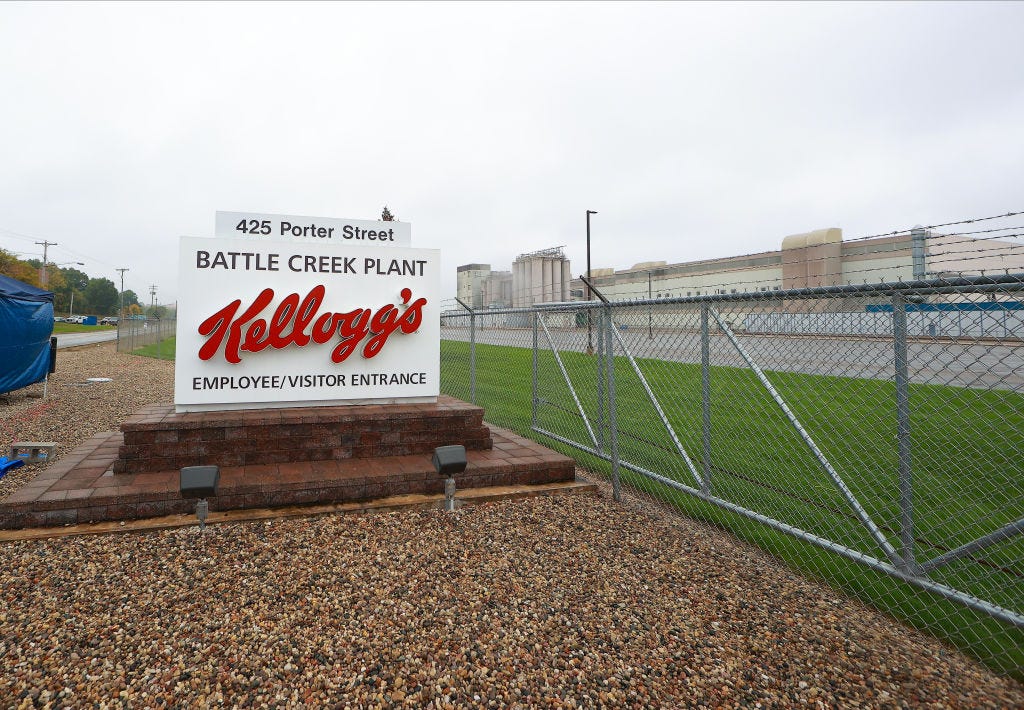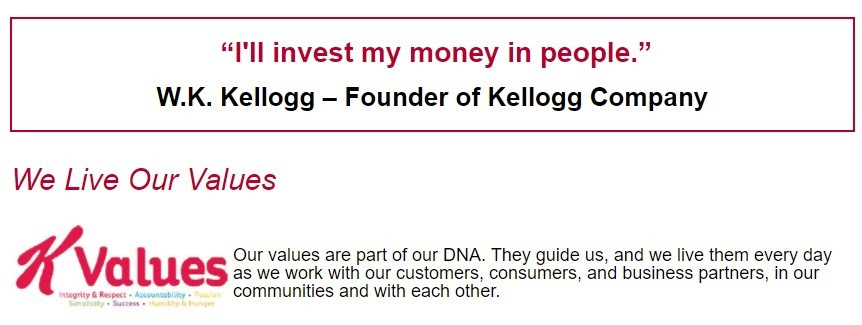W.K. Kellogg, the founder of Kellogg's, was an innovator in more ways than one. He famously invented Corn Flakes, Rice Krispies, and other popular cereals. But he also was committed to ensuring that the immense wealth produced by his company benefited his employees and the country. "I'll invest my money in people," Kellogg said.
His factories offered, free of charge, a "kindergarten, nursery, and day care center for the children of working mothers." All employees and their families were provided with comprehensive "medical, dental, and nutritional" benefits. Surrounding the plant was a "ten-acre, well-coiffed garden" that was available for "the enjoyment and recreation of workers." Most importantly, "he paid good wages to his factory workers, his executives, and his support staff."1
As the Great Depression gripped the country in 1930 and workers were laid off in droves, Kellogg "replaced the traditional three daily eight-hour shifts in his cereal plant with four six-hour shifts." This allowed everyone working at Kellogg to remain employed and for the company to offer jobs to laid-off workers in Battle Creek, Michigan. Kellogg also raised wages by 12.5%, twice, so that workers clocking fewer hours would maintain steady incomes.
The modern Kellogg's claims to reflect its founder's values. The company says that "W.K. Kellogg’s legacy continues to inspire us." The company boasts that today, it is "enriching communities and nurturing careers by putting people first in everything we do."
The reality is starkly different.
Kellogg's unionized workforce reports that today, factories are "purposely understaffed" with workers routinely required to clock "72- to 84-hour work weeks." (The company disputes those figures.) There is "a point system that dings you if you dare beg off to go watch your son’s Little League game." Covid has only made the situation worse, with some factories operating with 100 fewer workers than needed.
Decades of unionization enabled the company's factory workers to secure livable wages. But in 2015, Kellogg's claimed that increased labor costs would force it to shutter some of its factories unless the union made concessions. At the time, the union agreed to a new contract with a "two-tier compensation structure...in which newer employees earn lower wages and receive less generous benefits than veteran workers." New workers can "make $30,000 to $40,000 less a year for the same job" as veteran employees.
But now the cereal and snack business is booming. Kellogg's has "seen demand swell during the pandemic as consumers stay home and eat there more frequently instead of dining out." Through the first three quarters of 2021, the company reported $1.4 billion in profits.
The workers are now seeking fair compensation for all employees. Kellogg's factory workers have been on strike since early October when the 2015 union agreement expired. The company has responded with aggressive anti-union tactics, bringing "in strikebreakers that it has put up at the local Doubletree Hotel, paying them $30 an hour and giving them a $75 per diem." Soon after the strike began, Kellogg's cut off healthcare benefits for striking workers, who were "forced to pay up to $2,980 in COBRA payments" to maintain coverage.
The company's first offer was "a contract that made all new workers part of the lower tier with no chance of advancement." It later revised its proposal to allow current workers with more than four years of service to "graduate" to higher wages. Other workers would be allowed to move into these higher-paid slots as veteran workers retired. Kellogg's workers, however, "overwhelmingly voted to reject" the proposal and remain on strike.
The primary issue was Kellogg's refusal to put a cap on the percentage of "transitional" workers that receive lower wages. Veteran union members believe the proposal is a "Trojan Horse" that will marginalize the workers making higher wages and eventually enable the company to eliminate the higher tier entirely in future negotiations.
The company responded by announcing it would attempt to bust the union. In a statement Kellogg's said "the union created unrealistic expectations for our employees" and it had "no choice but to hire permanent replacement employees in positions vacated by striking workers." The company says that "there is no further bargaining scheduled and we have no plans to meet." Kellogg's insists that it is fulfilling its "obligation to our customers and consumers to continue to provide the cereals that they know and love."
Kellogg's grrreat executive compensation
Kellogg's commitment to keeping labor costs low does not seem to be an issue for its CEO and other top executives. Total annual compensation for Kellogg's CEO has increased from $7,634,101 in 2014, just before the last union contract went into effect to $11,663,852 in 2020, the last year available. That's an increase of about 54%.
The ratio of CEO pay to the pay of the median Kellogg's worker increased from 183 to 1 in 2017, the first year such data is available, to 279 to 1 in 2020. This likely understates the scope of the increase because Kellogg's excluded 1,459 employees from low-wage countries like Colombia and Ecuador when it made the calculation in 2020. Kellogg's did not report making this adjustment in 2017.
The legality of union-busting
Replacing striking workers with permanent replacements is a legal, but controversial, response to an economic strike. If Kellogg's and the union ultimately resolve their dispute or workers make an unconditional offer to return to work, the "replaced striker is placed on a preferential hiring list, and must be offered a job when an opening occurs."
The union has also filed several unfair labor practice complaints against Kellogg's. If the NLRB finds those complaints are valid, it would be illegal to permanently replace the striking workers. Under the law "employees striking on the basis of unfair labor practice are entitled to have their jobs back when the strike ends even if employees hired to do their work have to be discharged."
The local union president in Battle Creek, Michigan, where Kellogg's is headquartered, believes replacing striking workers permanently will be easier said than done. At the Michigan plant alone, 325 out of 410 workers are striking. The union believes recruiting and training that many people will be very difficult and the company will be "chasing their tail” for a long time.
According to reports, the process is not going smoothly:

Users of the website Reddit are making things harder by spamming Kellogg's job portal with fake applications in an effort to support striking workers.
Democrats, through legislation called the PRO Act, have sought to make the practice of permanently replacing economic strikers illegal. The legislation passed the House of Representatives in March but faces dim prospects in the Senate.
Among the supporters of the PRO Act is President Biden, who blasted Kellogg's decision to try to bust the union with permanent replacements. Biden said collective bargaining, which includes the right to strike, is "an essential tool to protect the rights of workers that should be free from threats and intimidation from employers." Kellogg's decision to permanently replace strikers "is an existential attack on the union and its members’ jobs and livelihoods," Biden said.
The Kelloggs: The Battling Brothers of Battle Creek (2017)




I grew up in Kalamazoo. One of the highlights of school trips was a trip to Kellogg's. Early school trips featured ice cream topped with Froot Loops. Now, I'm not sure if they even do school tours any longer. They've certainly lost the spirit of their founder. The Kellogg name appears on so many things in that area of Michigan and, for many years (most of my life) it was indicative of quality and caring. W.K. Kellogg must be spinning in his grave at the injustices perpetrated by Kellogg's current management.
This is why Unions are critically important to anchor and PROTECT our middle class WORKERS. Unions have been dying for years because of all the Republican maneuvers to break them. This has undermined our middle class to such an extent that it is literally disappearing. And what are we left with? More super, super rich corporations, shareholders and CEOs.